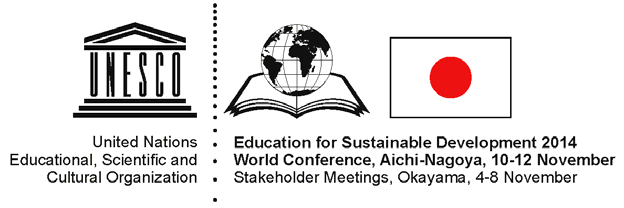Learning Today for a Sustainable Future - UNESCO World Conference on Education for Sustainable Development
10-12 November 2014, Aichi-Nagoya and Stakeholder Meetings, 4-8 November 2014, Okayama, Japan
Environmental, economic and social indicators tell us that our current model of progress is unsustainable. Ours is a world of looming challenges and increasingly limited resources. Sustainable development offers the best chance to adjust our course (UN Secretary-General Ban Ki-Moon).
Objectives of the Conference:
1. Celebrating a Decade of Action
“What have we achieved, what are the lessons learnt?” The World Conference will carry out a stock-taking of the implementation of the UN Decade of Education for Sustainable Development (DESD) and celebrate the Decade’s achievements. The Conference will showcase initiatives, actors, networks and ideas that were inspired by the DESD and review their impact on the basis of data provided by stakeholders and collected by UNESCO. With a view to post-Decade activities, the conference will celebrate the successes of the DESD but also analyze obstacles encountered and lessons learned. Examples of good practice from all over the world will provide insight into viable approaches to ESD and help to identify key areas for future action.
2. Reorienting Education to Build a Better Future for All
“How does ESD reinforce quality education?” Education for Sustainable Development allows everyone to acquire the values, competencies, skills and knowledge necessary to shape a future in line with sustainable development. ESD implies integrating content related to sustainable development into education and using teaching and learning methods that help learners acquire skills such as critical thinking and motivating themselves to act for a better future. ESD helps make education relevant today. Building on the Bonn Declaration from 2009, which states that “ESD is setting a new direction for education and learning for all”, the World Conference will address the importance of ESD as an integral component of quality education in the twenty-first century.
3. Accelerating Action for Sustainable Development
“How are sustainability challenges addressed through ESD?” Sustainable development cannot be achieved by technological solutions, political regulation or financial instruments alone. Achieving sustainable development requires a fundamental change of mindsets that results in changes of action. ESD, which addresses the interdependence of environment, economy and society, can help bring this change about. The World Conference will highlight the role of ESD for the transition to green economies and societies and as a catalyst for cross-sector planning and implementation of programmes in areas such as climate change, biodiversity and disaster risk reduction. The World Conference will also address how ESD can help move sustainable development policy and action forward to meet different global, regional, national, and local needs.
4. Setting the Agenda for ESD beyond 2014
“What are the strategies for our common future?” The review of the implementation of the DESD at the World Conference will lead to the development of strategies for ESD activities after 2014. With the target date of the Millennium Development Goals and the Education for All objectives approaching in 2015, and two years after the Rio+20 conference, the World Conference will also highlight the crucial role ESD plays for the next set of global education and development goals. It will make concrete contributions to the post-2014 education and sustainable development agendas. ESD must continue after 2014. The Conference will help ensure that it will.
See also:http://www.unesco.org/new/en/unesco-world-conference-on-esd-2014/
